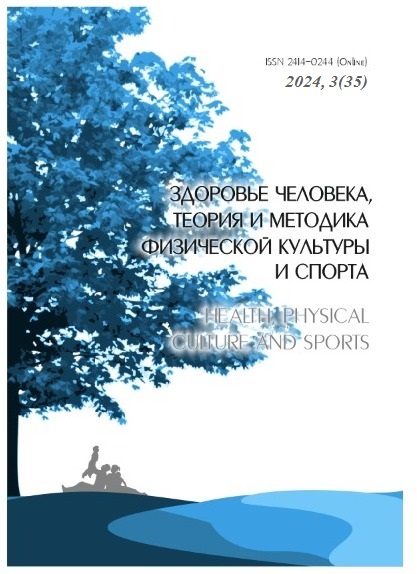THE INFLUENCE OF SKIING TRAINING ON THE DEVELOPMENT OF PHYSICAL QUALITIES IN A STUDENT
Abstract
Ski training is an effective way to maintain physical fitness and improve health, especially for students facing high levels of stress and time constraints. Student life is often filled with a large amount of data, constant lack of time, and inadequate conditions for a healthy lifestyle. However, integrating ski training into daily routine can significantly enhance both physical and mental well-being.
Physical activity associated with skiing offers a unique opportunity for comprehensive body strengthening. Firstly, ski training involves moderate muscle load, contributing to their development and strengthening. This is particularly important in the context of a sedentary lifestyle common among many students. Thanks to intensive work of all muscle groups, skiing improves endurance and strength, crucial for maintaining productivity amidst heightened stress levels.
Additionally, skiing positively affects the cardiovascular and respiratory systems. Regular workouts enhance blood circulation and oxygenation, vital for heart and lung health.
One of the significant advantages of ski training is the ability to exercise outdoors. This promotes body hardening and increases resistance to various diseases. Prolonged outdoor activities and active physical exercise in open air also have a beneficial effect on the nervous system, helping to cope with stress and improve psychological well-being.
Ski training also promotes the development of coordination and agility, which is important not only for physical but also for psychomotor development of students. Constant balance and body control required in skiing help improve body awareness and self-esteem.
Furthermore, ski training can be an excellent way to socialize and interact with like-minded individuals. Group workouts or trips to ski resorts can provide opportunities for students to make new contacts and strengthen friendships, which is also important for their psychological well-being
Downloads
References
Георгиева Н.Г. Влияние фитнес систем на формирование мотивации к занятиям физической культурой подростков специальной медицинской группы // Слобожанский научно-спортивный вестник. 2013. №5(38). С. 59–63.
М. Х. Джукаев, З. М. Гогоберидзе. Влияние физического воспитания на психическое здоровье студентов // Научно-теоретический журнал «Ученые записки университета имени П. Ф. Лесгафта». 2022. №10(212). [Электронный ресурс]. URL: https://lesgaft-notes.spb.ru/ru/node/24300 (дата обращения: 11.12.2023).
Иванова, А. К. Влияние физической культуры на физическую форму и психическое здоровье обучающегося // Молодой ученый. 2023. №47(494). С. 512-514. [Электронный ресурс]. URL: https://moluch.ru/archive/494/108138/ (дата обращения: 11.12.2023).
Филиппова Е.Н., Извеков К.В. Исследование влияния физкультурных занятий по лыжной подготовке на физическое состояние детей младшего школьного возраста // Фундаментальные исследования. – 2014. – № 1. – С. 138-142; URL: https://fundamental-research.ru/ru/article/view?id=33520 (дата обращения: 04.03.2024).
Зиновьев Н. А. Влияние валеолого-ориентированного педагогического сопровождения физической культуры на посещаемость занятий и здоровье студентов / Н.А. Зиновьев, Н.В. Пелагеич, М.В. Купреев // Ученые записки университета им. П.Ф. Лесгафта. - 2017. - № 3 (145). - С. 74-78.
Бисеров В.В., Тарбеева Н.М., Брехова Л.Л. Силовая подготовка студентов отделения лыжных гонок. Учебно-методическое пособие. — Екатеринбург: Издательство Уральского Федерального университета имени первого Президента России Б.Н. Ельцина, 2018 — 88 с. — ISBN 978-5-7996-2451-4
Грушин А.А., Виноградова О.Л., Попов Д.В. Физиологические основы оценки аэробных возможностей и подбора тренировочных нагрузок в лыжном спорте и биатлоне. М. : Советский спорт, 2014 .— 76 с. — Библиогр.: с. 63-73 (150 назв.). — ISBN 978-5-9718-0722 3
Жданкина Е.Ф., Добрынин И.М. Лыжная подготовка студентов в вузе. Учебное пособие. — Екатеринбург: Издательство Уральского университета, 2015 — 124 с. — ISBN: 978-5-7996-1395-2.
Калмыков С.Г., Асербеков О.У., Бирюков А.А. Методические основы занятий по лыжной подготовке. Учебное пособие. – Саратов: «Амирит», 2017 – 108 с. - ISBN 978-5-9500075-8-3
Combined program for young skiers' special endurance development during the preparatory period of the annual macrocycle / A. Vorozheikin, E. Romanova, M. Kolokoltsev [et al.] // Journal of Physical Education and Sport. – 2022. – Vol. 22, No. 4. – P. 941-947. – DOI 10.7752/jpes.2022.04119.
Young men's body hemodynamics variability in different states of motor activity / I. Bocharin, M. Guryanov, A. Martusevich [et al.] // Journal of Physical Education and Sport. – 2022. – Vol. 22, No. 3. – P. 562-569. – DOI 10.7752/jpes.2022.03070.
Cardiac diagnostics of student-athletes by the HRV method / I. Bocharin, M. Guryanov, M. Kolokoltsev [et al.] // Journal of Physical Education and Sport. – 2021. – Vol. 21, No. 6. – P. 3496-3503. – DOI 10.7752/jpes.2021.06473.
Complex pedagogical diagnostics of personal motor activity / P. V. Snezhitsky, E. Romanova, M. Kolokoltsev [et al.] // Journal of Physical Education and Sport. – 2022. – Vol. 22, No. 11. – P. 2681-2687. – DOI 10.7752/jpes.2022.11341.
Instrumental control of functional indicators in students with health deviation / I. Bocharin, M. Guryanov, E. Romanova [et al.] // Journal of Physical Education and Sport. – 2023. – Vol. 23, No. 5. – P. 1096-1102. – DOI 10.7752/jpes.2023.05137.
An author should not normally publish manuscripts describing essentially the same research in multiple journals or publication venues. Such redundant publication is generally considered to constitute unethical publishing behavior, and if discovered may result in a manuscript under consideration being rejected, or a published article being retracted.
Authors of manuscripts reporting on original research should present an accurate account of the work performed, accompanied by an objective discussion of its significance. Underlying data should be represented accurately in the manuscript. The manuscript should contain sufficient detail and references to permit others to replicate the work. The fabrication of results and the making of fraudulent or knowingly inaccurate statements constitute unethical behavior and may be cause for rejection or retraction of a manuscript or published article.





